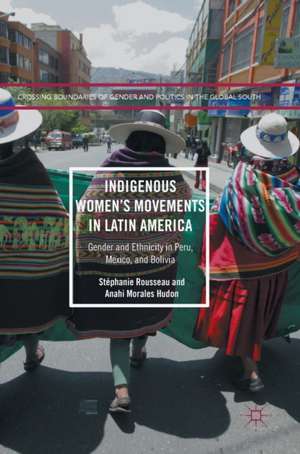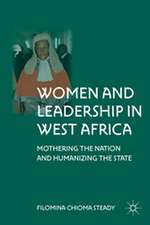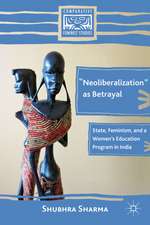Indigenous Women’s Movements in Latin America: Gender and Ethnicity in Peru, Mexico, and Bolivia: Crossing Boundaries of Gender and Politics in the Global South
Autor Stéphanie Rousseau, Anahi Morales Hudonen Limba Engleză Hardback – 20 dec 2016
| Toate formatele și edițiile | Preț | Express |
|---|---|---|
| Paperback (1) | 885.49 lei 6-8 săpt. | |
| Palgrave Macmillan US – 4 iul 2018 | 885.49 lei 6-8 săpt. | |
| Hardback (1) | 889.75 lei 6-8 săpt. | |
| Palgrave Macmillan US – 20 dec 2016 | 889.75 lei 6-8 săpt. |
Preț: 889.75 lei
Preț vechi: 1085.06 lei
-18% Nou
Puncte Express: 1335
Preț estimativ în valută:
170.26€ • 178.12$ • 141.43£
170.26€ • 178.12$ • 141.43£
Carte tipărită la comandă
Livrare economică 03-17 aprilie
Preluare comenzi: 021 569.72.76
Specificații
ISBN-13: 9781349950621
ISBN-10: 1349950629
Pagini: 221
Ilustrații: X, 225 p.
Dimensiuni: 148 x 210 x 19 mm
Greutate: 0.41 kg
Ediția:1st ed. 2017
Editura: Palgrave Macmillan US
Colecția Palgrave Macmillan
Seria Crossing Boundaries of Gender and Politics in the Global South
Locul publicării:New York, United States
ISBN-10: 1349950629
Pagini: 221
Ilustrații: X, 225 p.
Dimensiuni: 148 x 210 x 19 mm
Greutate: 0.41 kg
Ediția:1st ed. 2017
Editura: Palgrave Macmillan US
Colecția Palgrave Macmillan
Seria Crossing Boundaries of Gender and Politics in the Global South
Locul publicării:New York, United States
Cuprins
1. Indigenous women’s movements: An intersectional approach to studying social movements .- 2. Indigenous movements merge into party and state politics .- 3.Indigenous women transform the politics of representing women .- 4. Indigenous self-determination: from national dialogues to local autonomies .- 5. Indigenous women’s struggle for autonomy .- 6. The “exceptional case” no longer so exceptional .- 7. Indigenous women strengthen the indigenous movement .- 8. Conclusion.
Notă biografică
Stéphanie Rousseau is Associate Professor of Political Science at the Pontificia Universidad Católica del Perú. She is the author of Women’s Citizenship in Peru and also published several articles and book chapters on indigenous politics and women’s movements in Bolivia and Peru. She previously worked as Associate Professor at Université Laval, Canada.
Anahi Morales Hudon is Assistant Professor at the Faculty of Human Sciences, Saint Paul University, Canada. She has published articles on indigenous women’s movements in Mexico—Chiapas, Oaxaca, and Guerrero—in the Journal of Latin American Studies, Sociologie et Sociétés, and Recherches Féministes.
Textul de pe ultima copertă
This book presents a comparative analysis of the organizing trajectories of indigenous women’s movements in Peru, Mexico, and Bolivia. The authors’ innovative research reveals how the articulation of gender and ethnicity is central to shape indigenous women’s discourses. It explores the political contexts and internal dynamics of indigenous movements, to show that they created different opportunities for women to organize and voice specific demands. This, in turn, led to various forms of organizational autonomy for women involved in indigenous movements. The trajectories vary from the creation of autonomous spaces within mixed-gender organizations to the creation of independent organizations. Another pattern is that of women’s organizations maintaining an affiliation to a male-dominated mixed-gender organization, or what the authors call “gender parallelism”. This book illustrates how, in the last two decades, indigenous women have challenged various forms of exclusion through different strategies, transforming indigenous movements’ organizations and collective identities.
Caracteristici
Proposes a new perspective on indigenous movements based on a gendered framework of analysis Provides a detailed analysis of the relations between global North and global South through the lens of gender Offers new insights in the gendered dimensions of migration and global labour regimes
















